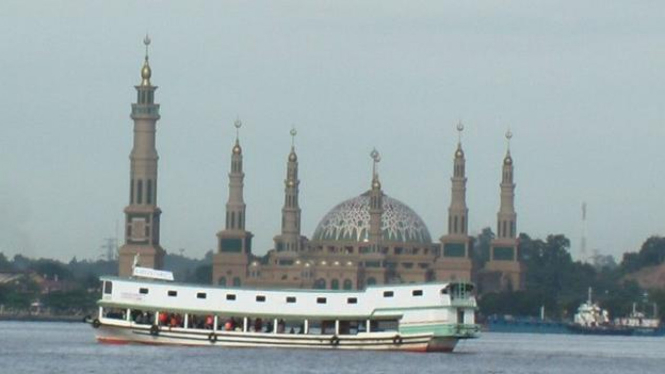- Antara/ M Imron Rosyadi
VIVAnews – History has it that the early wave of Chinese Muslims migration into Indonesia was not intended to spread the teachings of Islam. Welfare was the main reason they came into the archipelago.
The voyage of Admiral Zheng He to Indonesia in the 15th century was also of the cause. Zheng He was the first Chinese Muslim leader who explore Southeast Asia.
He along with his men, who were also Muslim, sought to attain his goals in strengthening China's relations with Asian and Africana countries through trade and diplomacy.
Some references write that Zheng He were accompanied with two interpreters, Ma Huan and Guo Chong Li, who were very proficient in Arabic and Persian. Although the initial goal was not to propagate Islam, the assimilation process made many residents of the places they visited eventually embraced Islam.
Immigrants of Chinese descendant played a major role in converting the people to Islam. Several sources noted that some of the members of the Wali Songo (the nine revered saints of Islam in Indonesia, especially in Java, because of their historic role in the spread of Islam in Indonesia) had Chinese blood in them.
So the assimilation of Chinese and indigenous Muslims actually took place. However, when the Dutch came and put into practice divide-and-conquer policy, the integration failed. The policy divided the population into three groups, namely European, Easterners (Chinese, Indian, Arabic), and the natives or inlanders, who were of Muslim majority.
The Dutch appeared to be afraid to see the Chinese and Muslims united, so they made regulations that could separate these two categories. Then in the 18th century, the Dutch issued a regulation banning the Chinese from converting to Islam forbidding Muslims from marrying a Chinese ethnic. The colonial regulation further distanced the Chinese from the natives.
In order to unite Chinese Muslims with Indonesian Muslims, Chinese Muslims with Chinese ethnic and Chinese ethnic with the Indonesian natives, Haji Isa Idris initiated the establishment of the Chinese Muslim Association of Indonesia (PITI) on April 14, 1961, in Jakarta.
However, in 1972, at the urging of the Attorney General’s Office, which deemed the religion of Islam as universal, thus there is no such term as Chinese Muslims or other Islam, then the PITI changed its name into Islamic Tawhid Builder. PITI changed back into Chinese Muslim Association of Indonesia after being deliberated in the organizational leaders’ meeting in May 2000.
There are no official data on the number of Chinese Muslims in Indonesia. PITI, as an organization that houses Chinese Muslims, does not collect the data regarding the exact number of Chinese Muslims in Indonesia. PITI viewed that such data are not necessary because it suggests the partition between native Muslims and Chinese Muslim.
The grouping between the Chinese and the natives actually suggests a gap between the two. No wonder, whether noticed or not, people still have a certain stereotype for ethnic Chinese, that they are generally rich, they tend to be exclusive, stingy, ethnocentric, and apathetic.
Given the problem of national inter-ethnicity, PITI has a mission to be the mediator. Thinking that there is no problem anymore with the natives who are Muslim majority, PITI has a duty to disseminate Islam among the non-Muslim Chinese.
Socialization is important to mend the impaired perceptions that have been firmly implanted in the minds of both societies. These include that ethnic Chinese are exclusive and wealthy, albeit such perceptions are not entirely true.
Meanwhile, non-Muslim Chinese hold to the stigma that Islam or the natives is of the lower class, so they need not mingle with the latter. The Dutch divide-and-rule policy was significant in engrafting the perceptions in the minds of Indonesians. The brainwashing was deliberately made to ruin Indonesia as a nation.
PITI is expected to be able to nourish the communication with non-Muslim Chinese. The similarity of characters between the Muslim Chinese and non-Muslim Chinese is expected to make smoother communication possible. Thus, the misperceptions between the natives and non-Muslim Chinese can be addressed.
As regards the spread of Islam among the ethnic Chinese, the Haji Karim Oei Foundation (YHKO) should also be noted. Karim Oei was a prominent Muslim of Chinese descent who was familiar with such national founding fathers as Sukarno and Muhammad Hatta. Apart from being known as a devout Muslim who practiced the Islamic Sharia, he was also a successful entrepreneur who co-founded Bank Central Asia (BCA).
The foundation was established in 1991 by Haji Junus Jahya to commemorate Karim Oei. YHKO Jakarta is located in a four-storey shophouse on Jalan Pasar Baru Lautze 87-89, where the ground floor functioned as a mosque (Masjid Lautze).
Various activities are carried out here, such as regular Quran recitals on Sundays (open for public), study of religion, mental health therapy, Mandarin course and education for the converts.
--
Translated by: Indah Lestari




















